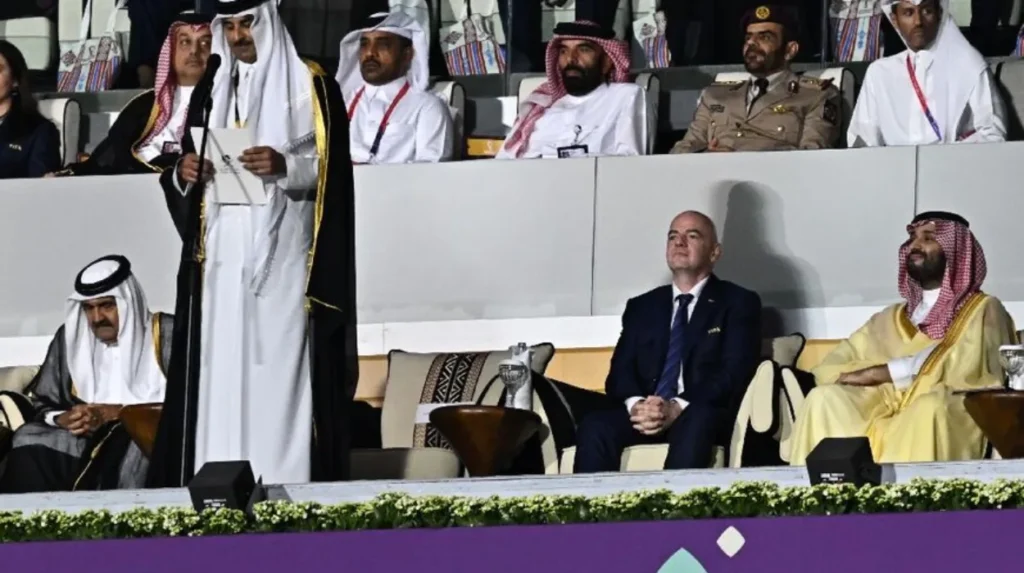The economy of Saudi Arabia beyond oil continues to expand — with the July 2025 Purchasing Managers’ Index (PMI) at 56.3, comfortably above the neutral point of 50. It signals positive business sentiment, continued hiring, and steady domestic demand. Saudi Arabia’s entire economy also rose 3.9% year-over-year in Q2 2025, driven by non-oil sectors.
Although these kinds of statistics are heartening, they serve a double role: economic development and image-building on the world stage. It is centered on this shift that Saudi Arabia boldly plans to stage the FIFA World Cup. However, I firmly believe, as a strong critic of it, no economic indicator justifies rewarding a regime with a persistent record of human rights abuse.
The Facade of Growth
Vision 2030 of Saudi Arabia has invested billions in lowering oil dependency and upgrading infrastructure. PIF, the tool that has financed these changes, has assets of over $925 billion as of 2024 and is set to reach $1.5 trillion by 2030.
Among its key goals are to increase tourism from 27 million in 2019 to 100 million visitors by 2030, increase non-oil government revenue from $43.5 billion in 2016 to $266 billion by 2030, and increase female workforce participation from 17% (2017) to 30% — a goal officially announced and reached in 2022.
Sportswashing: A Global Distraction
Saudi Arabia’s massive investments in sports are no secret. In the past five years alone, the Kingdom has invested over $6.3 billion in sports since 2021. It bought English Premier League football club Newcastle United through its PIF for $409 million, invested over $2 billion to finance LIV Golf as a rival to the PGA Tour, and hosted high-profile events like Formula One, WWE fights, heavyweight boxings, and e-sports tournaments.
Now, Saudi Arabia wants the holy grail: the FIFA World Cup. But here, too, it is not about football; this is about reputation washing — using sport as a tool of distraction from state-sponsored oppression.
Behind the Growth: Brutality and Repression
Internally, Saudi Arabia’s reality remains repressive and authoritarian in spite of its external modernization.
On human rights, the record is deeply disturbing. Amnesty International reports that the Kingdom carried out executions of 172 people in 2023, and 81 people were executed in one day in 2022—the biggest mass execution in Saudi Arabia’s recent history. The majority of these executions were following trials that fell short of international standards, being founded largely on confessions obtained through torture.
For women, even a few gains have been made—such as lifting the ban on driving and allowing travel without male authorization—but male tutelage law is still on the statute books. Women are still under the control of males for marriage, release from prison, and in some places, work or access to some medical treatment. This upholds a deeply patriarchal system that contradicts the illusion of progress that the regime seeks to project.
Migrant Workers: The Unseen Driver of Growth
Foreigners make up the majority of employees behind the non-oil boom. There are more than 10 million migrant workers in Saudi Arabia alone, accounting for almost 77% of the private sector’s workforce. They make up the backbone of the construction, retail, and hospitality industries — all of which have grown along with gigantic hiring numbers, according to the July 2025 PMI report.
But the price for this progress is made behind silent suffering. The majority of these workers remain trapped by the kafala system, a sponsorship-based system that restricts their freedom and leaves them vulnerable to exploitation. Even though reforms were promised, their enforcement remains weak, and thousands of workers remain victimized by contract abuse, wage theft, and abusive labor conditions. More than 500,000 migrant workers were forced back to their countries of origin in 2023 alone, in the majority of instances without fair justice or compensation.
The FIFA World Cup: What’s at Stake?
FIFA has taken decades promoting football as a global force for good — one of inclusiveness, diversity, equality, and respect. Holding the World Cup in Saudi Arabia is directly counter to those principles.
Saudi Arabia’s record is directly at odds with FIFA’s own values. The country has a decades-long track record of repressing women, criminalizing LGBTQ+ people, jailing activists, and censoring the media. There isn’t actually press freedom. Human rights are systematically violated. And LGBTQ+ citizens aren’t just left out — they’re persecuted.
What Needs to Happen
If Saudi Arabia is intent on being embraced as a twenty-first-century host of global events, it must do more than build facilities and release economic figures. It must:
- Eradicate entirely the kafala system
- Release political detainees and human rights activists
- Legalize and protect LGBTQ+ identities
- Abolish the male guardianship system in full
- Bequeath freedom of expression and allow a free press
Until that happens, FIFA ought to deprive them of the World Cup.
Ban the Saudi FIFA World Cup
Saudi Arabia’s July 2025 economic reports may show encouraging indications. Its non-oil economies may be flourishing, and Vision 2030 may be working. But all these should not distract from the truth: economic growth without freedom and justice is not real development — it’s a mirage.
As a staunch proponent of excluding Saudi Arabia from the right to host the FIFA World Cup, I call on sporting fans, human rights organizations, and world citizens to buck the trend. We cannot offer dictators who trample on human dignity for the sake of modernization our accolades. Football isn’t a sport. It’s a global stage. And the stage will never be used to establish despotism and fear-mongering as the new normal.

